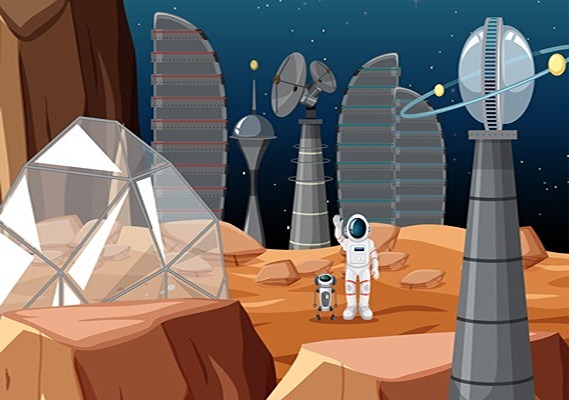Space exploration has always fascinated humankind, driving us to push the boundaries of what is possible. The dream of colonizing Mars, our neighboring planet, has transitioned from science fiction to a serious scientific endeavor. With great in technology, we comes on the brink of making interplanetary society a reality. In this comprehensive article, we will delve into the prospects of Mars colonization, examining the technological innovations, challenges, and potential benefits of establishing a human presence on the Red Planet.
The Vision of Mars Colonization
Mars colonization envisions humans living and thriving on Mars, creating a self-sustaining colony. This vision is driven by the need for a backup plan for humanity in case of Earth-bound catastrophes, the quest for scientific knowledge, and the inherent human spirit of exploration. Companies like SpaceX, led by Elon Musk, and governmental space agencies such as NASA are at the forefront of this endeavor.
Technological Innovations for Mars Colonization
1. Advanced Spacecraft and Propulsion Systems
The journey to Mars requires advanced spacecraft capable of enduring long-duration missions. Innovations in propulsion systems, such as SpaceX’s Starship and NASA’s Space Launch System (SLS), aim to reduce travel time and increase payload capacity. These spacecraft are designed to withstand the harsh conditions of space travel, ensuring the safety of astronauts during their journey to Mars.
2. Life Support Systems
Culminate human life on Damages requires progressed life bolster systems. These systems must provide a stable supply of oxygen, water, and food while managing waste efficiently. Closed-loop life support systems, which recycle air and water, are critical for long-term survival. Research is ongoing to develop sustainable agricultural systems that can produce food on Mars using Martian soil and limited resources.
3. Habitat Construction and Sustainability
Building habitats on Mars poses unique challenges due to the planet’s harsh environment. Inflatable habitats, 3D-printed structures using Martian regolith, and underground bases are being explored as viable options. These habitats must protect inhabitants from extreme temperatures, radiation, and dust storms. Sustainable energy sources, such as solar panels and nuclear power, are essential for powering these habitats.
4. Robotics and Automation
Robots and automated systems play a crucial role in Mars colonization. They are tasked with constructing habitats, mining resources, and conducting scientific research. Autonomous rovers and drones can perform tasks that are too dangerous or labor-intensive for humans, enhancing the efficiency of colonization efforts.
Challenges of Mars Colonization
1. Harsh Environmental Conditions
Mars has a thin atmosphere, extreme temperatures, and high radiation levels, making it inhospitable for human life. Colonists will need to develop robust protection against these conditions. This includes radiation shielding, thermal control systems, and pressurized habitats.
2. Psychological and Social Factors
Long-duration space missions and isolation from Earth pose significant psychological challenges. Maintaining mental health and social cohesion among colonists is crucial. Strategies include virtual reality for recreation, regular communication with Earth, and the establishment of a supportive community structure.
3. Resource Scarcity
Mars lacks many of the resources found on Earth, such as readily available water and breathable air. In-situ resource utilization (ISRU) is important for extracting and completing Martian resources. This includes extracting water from ice deposits, producing oxygen from carbon dioxide, and mining minerals for construction.
Potential Benefits of Mars Colonization
1. Scientific Discovery
Mars colonization offers unprecedented opportunities for scientific research. Studying Mars’s geology, climate, and potential for past life can provide insights into the history of our solar system and the potential for life elsewhere. A human presence on Mars allows for more flexible and in-depth exploration compared to robotic missions.
2. Technological Advancements
The challenges of Mars colonization drive technological innovation that can benefit life on Earth. Advances in life support systems, renewable energy, robotics, and materials science have applications beyond space exploration. These technologies can improve sustainability, healthcare, and infrastructure on our home planet.
3. Economic Opportunities
Establishing a presence on Mars can create new economic opportunities. This includes mining rare minerals, developing new industries, and creating jobs related to space exploration and technology. The commercialization of space can lead to economic growth and innovation.
4. Ensuring Human Survival
Mars colonization gives a chance to protect for human civilization. In the event of catastrophic events on Earth, such as natural disasters or pandemics, a self-sustaining colony on Mars ensures the survival of humanity. This redundancy is crucial for the long-term survival of our species.
Conclusion
The dream of Damages colonization is getting to be a substantial reality much obliged to fast headways in space investigation innovation. The journey to establish a human presence on Mars is fraught with challenges, but the potential benefits are immense. By overcoming environmental, psychological, and logistical hurdles, we can create a new frontier for human civilization. The pursuit of Mars colonization not only satisfies our innate desire for exploration but also ensures the longevity and prosperity of humanity




